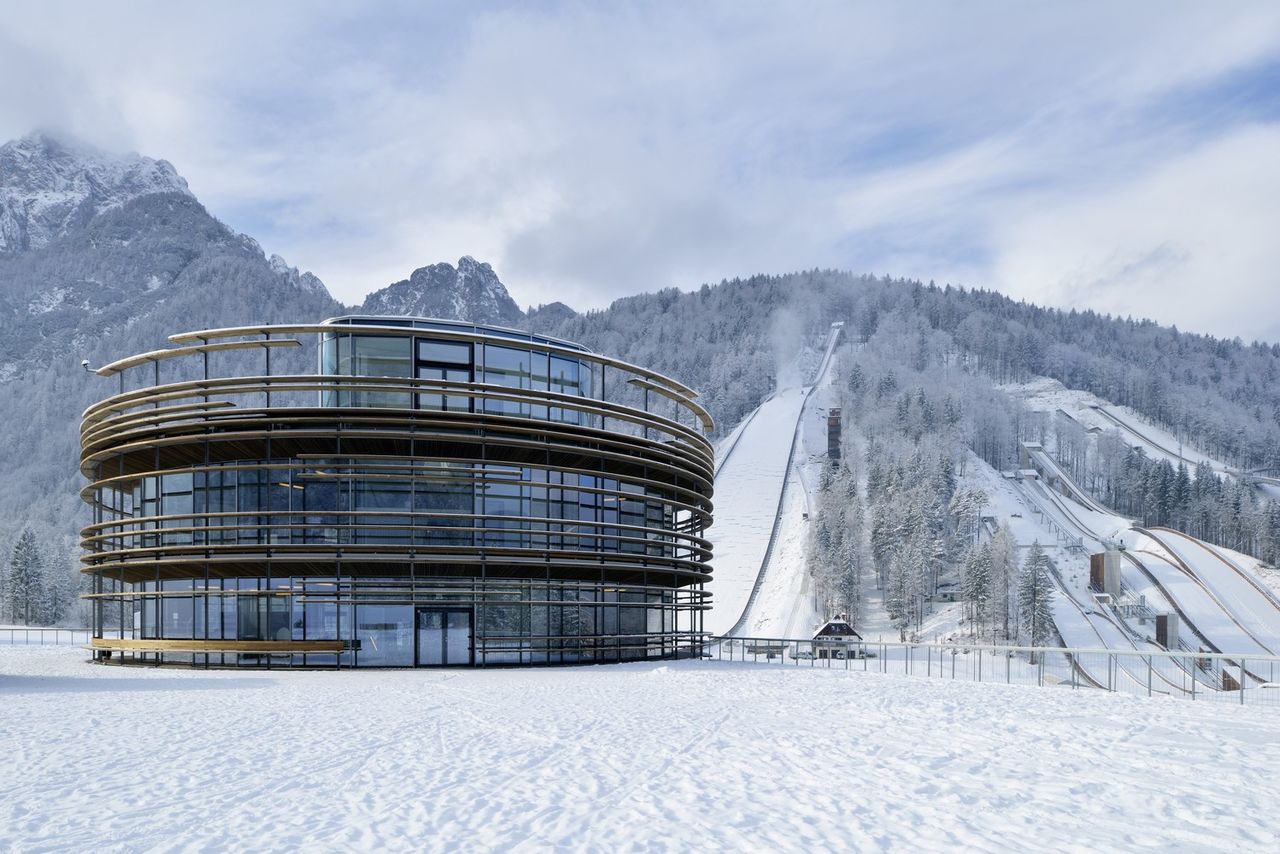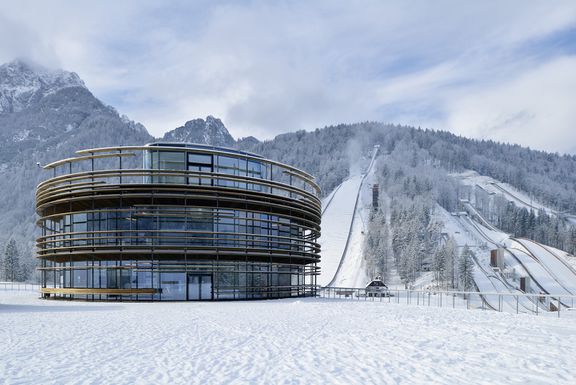Difference between revisions of "Planica Museum"
Anže Zorman (talk | contribs) |
Anže Zorman (talk | contribs) |
||
| Line 13: | Line 13: | ||
| website = http://www.nc-planica.si/ | | website = http://www.nc-planica.si/ | ||
| managed by = Slovene Sports Museum | | managed by = Slovene Sports Museum | ||
| − | | managed by 2 = | + | | managed by 2 = Institute of Sports of the Republic of Slovenia |
| contacts = {{Contact | | contacts = {{Contact | ||
| name = Jure Žerjav | | name = Jure Žerjav | ||
| − | | role = Head of | + | | role = Head of Nordic Centre Planica |
| telephone = 386 (0) 41 635 966 | | telephone = 386 (0) 41 635 966 | ||
| email = jure.zerjav@nc-planica.si | | email = jure.zerjav@nc-planica.si | ||
}}{{Contact | }}{{Contact | ||
| − | | name = | + | | name = Iztok Durjava |
| − | | role = | + | | role = Head of the museum |
| − | | telephone = 386 (0) | + | | telephone = 386 (0) 40 229 786 |
| − | | email = | + | | email = |
}} | }} | ||
}} | }} | ||
| Line 31: | Line 31: | ||
The [[Planica Museum]] is dedicated to the history of ski jumping and flying in Planica, an alpine valley in north-western Slovenia. Historically, this valley has been one of the prime sites for the development of ski flying as a sports discipline of its own, and consequently the museum also presents the wider history of ski jumping as such. Nevertheless, it's main focus is to present and develop both the cultural as well as technical heritage of almost a century of ski jumping in Planica. | The [[Planica Museum]] is dedicated to the history of ski jumping and flying in Planica, an alpine valley in north-western Slovenia. Historically, this valley has been one of the prime sites for the development of ski flying as a sports discipline of its own, and consequently the museum also presents the wider history of ski jumping as such. Nevertheless, it's main focus is to present and develop both the cultural as well as technical heritage of almost a century of ski jumping in Planica. | ||
| − | Set in a newly constructed pavilion as a part of a nordic skiing complex called the | + | Set in a newly constructed pavilion as a part of a nordic skiing complex called the Nordic Centre Planica, the museum opened its doors in [[established::2016]]. Its exhibition was collected and set up by dr. [[Iztok Durjava]], of the [[Slovene Sports Museum]]. |
}} | }} | ||
| Line 41: | Line 41: | ||
In 1969, another and even more ambitious flying hill was erected. This one followed suit as once again the prime site for most of record lengths until 2005. Together with some exceptional sportsman, all of this played a significant part in Planica becoming something of a cultural phenomena in Slovenia. | In 1969, another and even more ambitious flying hill was erected. This one followed suit as once again the prime site for most of record lengths until 2005. Together with some exceptional sportsman, all of this played a significant part in Planica becoming something of a cultural phenomena in Slovenia. | ||
| − | ===The | + | ===The Nordic Centre Planica=== |
| − | By the end of 2015, the | + | By the end of 2015, the Nordic Centre Planica was completed and inaugurated. It is a modern nordic skiing complex that boasts eight newly built or renovated ski jumping and flying hills and which also caters to cross-country skiing and various summer activities. The three bureaus that handled the architectural dimensions of the project – from landscape design to the pavilion that houses the museum – are [[Studio AKKA]], [[A.biro]] and [[Stvar]]. Their work was honoured for outstanding Slovene achievements in visual creativity by the TREND award 2015. |
==Permanent collection exhibition== | ==Permanent collection exhibition== | ||
| − | The museum is divided into | + | The museum is divided into two parts, each of them on its own floor. There is also an additional ground floor, freely open for everyone, which is composed of a few interactive video displays that present and illustrate both the local as well as global histories of ski jumping and cross-country skiing. |
The upper two floors deal with the development of ski jumping in Planica and with its prime protagonists, the sportsmen as well as the craftsmen. Of the latter, the most important figures are [[Stanko Bloudek]], [[Ivan Rožman]] and the brothers [[Vlado Gorišek|Vlado]] and [[Janez Gorišek]]. The first two are responsible for the "Bloudek Giant", and the era of this ski jumping hill (1934 – 1969) is covered on the first floor. The construction of the Gorišek brothers hill marks the second era, which is featured on the second floor. | The upper two floors deal with the development of ski jumping in Planica and with its prime protagonists, the sportsmen as well as the craftsmen. Of the latter, the most important figures are [[Stanko Bloudek]], [[Ivan Rožman]] and the brothers [[Vlado Gorišek|Vlado]] and [[Janez Gorišek]]. The first two are responsible for the "Bloudek Giant", and the era of this ski jumping hill (1934 – 1969) is covered on the first floor. The construction of the Gorišek brothers hill marks the second era, which is featured on the second floor. | ||
| − | The museum collection displays various pieces of ski jumping equipment, different cups and medals, accessories of the aforementioned engineers, some archival specimens of the technology used by [[Radio-Television Slovenia (RTV Slovenia)|Radio-Television Slovenia]] to transmit the jumps, | + | The museum collection displays various pieces of ski jumping equipment, different cups and medals, accessories of the aforementioned engineers, some archival specimens of the technology used by [[Radio-Television Slovenia (RTV Slovenia)|Radio-Television Slovenia]] to transmit the jumps, sport suits worn by Slovenian jumpers, and so on. There is naturally also a series of explanatory texts, pictures, holograms and videos, many of them gathered in a small reading room. |
Of a more interactive nature are simulators of actual ski jumps and, if slightly less physical, of ski jumping judging. Though not directly a part of the museum, there is also a wind tube that enables the experience of floating. | Of a more interactive nature are simulators of actual ski jumps and, if slightly less physical, of ski jumping judging. Though not directly a part of the museum, there is also a wind tube that enables the experience of floating. | ||
| Line 62: | Line 62: | ||
== External link == | == External link == | ||
| − | * [http://www.nc-planica.si/ | + | * [http://www.nc-planica.si/ Nordic Centre Planica website] (in Slovenian) |
* [http://www.zsrs-planica.si/ Planica Institute of Sports website] (in Slovenian) | * [http://www.zsrs-planica.si/ Planica Institute of Sports website] (in Slovenian) | ||
| − | * [http://www.osc-planica.si/uploads/NC%20Planiva%20Eng.pdf A presentation of the | + | * [http://www.osc-planica.si/uploads/NC%20Planiva%20Eng.pdf A presentation of the Nordic Centre Planica] (in English) |
| − | * [https://en.wikipedia.org/wiki/Planica_Nordic_Center | + | * [https://en.wikipedia.org/wiki/Planica_Nordic_Center Nordic Centre Planica on Wikipedia] |
[[Category:Museums]] | [[Category:Museums]] | ||
Revision as of 16:38, 1 March 2016
Background
The history of ski jumps in the Planica valley starts in the late 1920s, when first considerations to develop the valley into an international sports tourism centre surfaced. This was followed by the construction of the first ski jumping hill in 1930. A much bigger one, called the Bloudek Giant [Bloudkova velikanka], was finished in 1934, when it also claimed its first world record. Soon after, the first ever jump over 100 metres was realised there, and along it also a new discipline called ski flying. Until 1950, all but one ski flying world record was achieved in Planica.
In 1969, another and even more ambitious flying hill was erected. This one followed suit as once again the prime site for most of record lengths until 2005. Together with some exceptional sportsman, all of this played a significant part in Planica becoming something of a cultural phenomena in Slovenia.
The Nordic Centre Planica
By the end of 2015, the Nordic Centre Planica was completed and inaugurated. It is a modern nordic skiing complex that boasts eight newly built or renovated ski jumping and flying hills and which also caters to cross-country skiing and various summer activities. The three bureaus that handled the architectural dimensions of the project – from landscape design to the pavilion that houses the museum – are Studio AKKA, A.biro and Stvar. Their work was honoured for outstanding Slovene achievements in visual creativity by the TREND award 2015.
Permanent collection exhibition
The museum is divided into two parts, each of them on its own floor. There is also an additional ground floor, freely open for everyone, which is composed of a few interactive video displays that present and illustrate both the local as well as global histories of ski jumping and cross-country skiing.
The upper two floors deal with the development of ski jumping in Planica and with its prime protagonists, the sportsmen as well as the craftsmen. Of the latter, the most important figures are Stanko Bloudek, Ivan Rožman and the brothers Vlado and Janez Gorišek. The first two are responsible for the "Bloudek Giant", and the era of this ski jumping hill (1934 – 1969) is covered on the first floor. The construction of the Gorišek brothers hill marks the second era, which is featured on the second floor.
The museum collection displays various pieces of ski jumping equipment, different cups and medals, accessories of the aforementioned engineers, some archival specimens of the technology used by Radio-Television Slovenia to transmit the jumps, sport suits worn by Slovenian jumpers, and so on. There is naturally also a series of explanatory texts, pictures, holograms and videos, many of them gathered in a small reading room.
Of a more interactive nature are simulators of actual ski jumps and, if slightly less physical, of ski jumping judging. Though not directly a part of the museum, there is also a wind tube that enables the experience of floating.
See also
External link
- Nordic Centre Planica website (in Slovenian)
- Planica Institute of Sports website (in Slovenian)
- A presentation of the Nordic Centre Planica (in English)
- Nordic Centre Planica on Wikipedia




